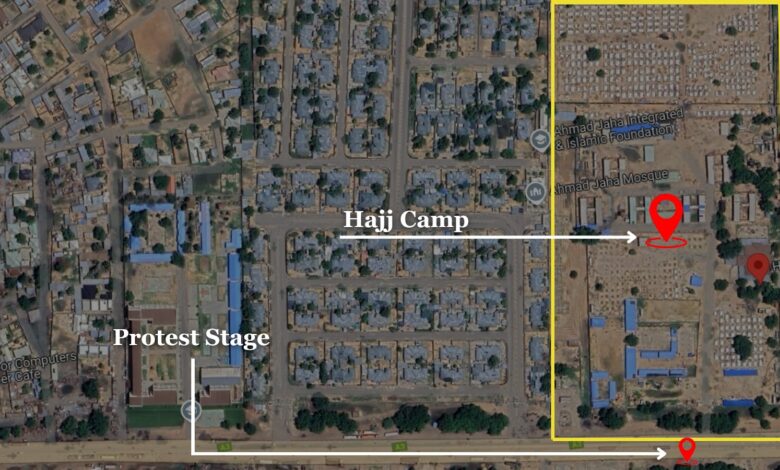Protests by Former Boko Haram Members Raise Safety Concerns Among Maiduguri Residents
Continued protests by former Boko Haram members undergoing rehabilitation by the Borno state government over welfare issues are raising significant safety concerns among residents living in Maiduguri, especially those near the rehabilitation centre.

Former members of the Boko Haram terror group, who had previously surrendered to the Nigerian state, staged a protest on Thursday morning over welfare issues, briefly causing chaos along the Maiduguri-Kano road in Maiduguri, the Borno state capital in northeastern Nigeria.
The protest began around 9 a.m. and lasted for about an hour, with protesters throwing stones at passing vehicles and blocking the highway, locals say.
HumAngle learned from a member of Hajj Camp management, who requested anonymity that the protest was triggered by a one-day delay in the monthly food supplies to the repentant members. “Normally, food supplies are distributed on the 7th or 8th day of every month. However, there was a one-day delay, leading them to march to the street for protest,” the source explained.
Eyewitnesses interviewed by HumAngle revealed that the protesters, residing in a rehabilitation facility at the Hajj Camp, blocked the road in frustration over the government’s failure to disburse their allowances.
Musa Zanna, a resident who witnessed the incident, described the scene as “chaotic and frightening.” He noted that the protesters were shouting, claiming the government had neglected and forgotten them. “They were saying they are suffering, that the government has forgotten about them,” Zanna said.
Local sources say that soldiers from the 33 Military Artillery barracks, located opposite the scene, intervened to disperse the protesters and restore order, bringing the situation under control. The road was eventually cleared, and traffic resumed.
This is not the first time surrendered Boko Haram members have protested at the Hajj Camp rehabilitation facility, with previous demonstrations also centred around nonpayment of allowances and complaints over welfare issues. These recurring protests have raised concerns among residents about safety and the government’s ability to manage the situation.
Last year, the surrendered Boko Haram insurgents, under a rehabilitation exercise, protested over hunger and nonpayment of monthly stipends. Usman Tar, the Borno state commissioner of information and internal security, was quoted to have said, “A total of 6,900 repentant insurgents are processed under the multi-agency framework of Disarmament, Demobilisation, Deradicalisation, Rehabilitation, Reconciliation and Reintegration (DDDRRR), [commonly known as the Borno Model].”
Residents living near the Hajj Camp have expressed displeasure over the former insurgents’ continued protests.
Alhaji Abubakar, a resident in the neighbourhood, voiced deep concerns about the recent demonstration, stating that he expected the repentant individuals to show genuine commitment to their new path rather than resorting to violence when dissatisfied with the authorities managing them. “The government is dealing with numerous issues, such as the aftermath of the recent flood disaster. It is troubling that a delay in addressing their welfare led them to stage a protest with destructive intentions,” Abubakar said.
“I am displeased by their repeated actions, especially since this is at least the third time they have staged protests and caused disruptions. We have witnessed firsthand how these protests lead to destruction and inconvenience for those using the roads,” he added.
He called on urgent government intervention, stating, “We urge the government to act quickly, as the situation is escalating and putting those of us living nearby at risk. These protests are not only disruptive but dangerous. They block roads, damage businesses, and even injure people. Just yesterday, one man was hit on the head and injured during the protest.”
Residents demand that the rehabilitation centre be relocated from residential areas to ensure public safety during such incidents. “This is a serious concern. It causes panic, destruction and puts lives in danger. We are calling on the government to take decisive measures, such as relocating the repentant members away from residential areas because their presence threatens our safety,” Abubakar said.
Another resident of the 1000 housing units adjacent to the camp, who pleaded anonymity, expressed concern about the authorities’ lack of transparency.
He remarked, “Though the Borno Model emphasises rehabilitation and reintegration as a way to prevent re-radicalisation, there is a need for greater transparency in how these individuals are managed. I believe it is essential that the government balances reintegration efforts with accountability, taking these former insurgents through legal processes.”
“The safety of the general population must come first. My call is for the government to strengthen collaboration with community leaders, improve the monitoring of reintegrated individuals, and keep the public informed about the progress of the Borno model. That way, trust can be built, and long-term peace and stability will have a better chance of succeeding.”
Former Boko Haram members, living at the Hajj Camp in Maiduguri, Nigeria, protested over a delay in their monthly food supplies, leading to chaos and temporarily blocking the Maiduguri-Kano road.
This incident is one in a series of protests by the rehabilitated insurgents, who have previously expressed grievances over welfare issues and nonpayment of allowances.
Local residents near the camp have voiced concerns over recurring disruptions and urged the government to relocate the facility to ensure public safety.
The residents also call for improved transparency and accountability in the management of the rehabilitated individuals to prevent re-radicalisation and promote trust in governmental efforts.
Support Our Journalism
There are millions of ordinary people affected by conflict in Africa whose stories are missing in the mainstream media. HumAngle is determined to tell those challenging and under-reported stories, hoping that the people impacted by these conflicts will find the safety and security they deserve.
To ensure that we continue to provide public service coverage, we have a small favour to ask you. We want you to be part of our journalistic endeavour by contributing a token to us.
Your donation will further promote a robust, free, and independent media.
Donate HereStay Closer To The Stories That Matter




